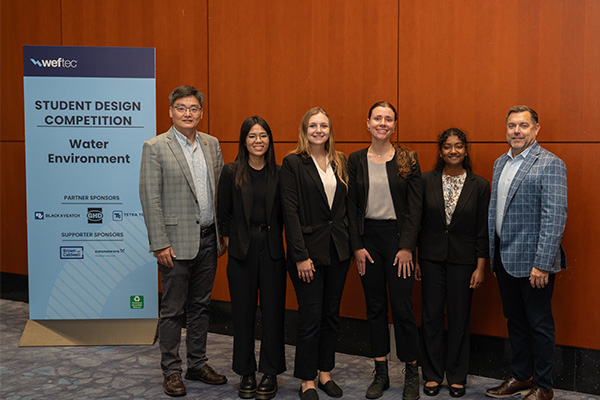'I can handle it’: Math crash course preps new students for PhD life
Imaging science students taught incoming doctoral students advanced math concepts and created a supportive community

The imaging science doctoral program at Washington University in St. Louis, one of the newest doctoral programs at the McKelvey School of Engineering, attracts students from a range of academic and professional backgrounds.
Wiete Fehner, a doctoral student in imaging science, realized that not every student has an engineering background and may not be entering the program directly from undergraduate study. That’s why she had the idea to launch a crash course that would introduce – or in some cases, refresh – advanced mathematics.
“I'm from a neuroscience background, so it was difficult for me to adjust to an engineering program that includes a lot of advanced math concepts,” Fehner said. “I'm also an international student, and there are many things that come with entering grad school for incoming international students.”
Fehner and four other students began developing the course in January. The team included Ty Easley, Morgan Fogarty, Nischal Khanal and Sungmin Park, all students in the imaging science program.
“The way the five of us got pulled into this looks a lot like the way the program took off in general,” Easley said. “Wiete pitched it in a meeting, and I thought, ‘This is so cool. Can I help?’ Nischal, Sungmin and I talked about it, and they were at the next meeting.”
The team designed the course curriculum to expose students to math topics they’ll encounter in the introductory imaging science courses.
"There's a lot of material to cover, and we don’t want students to get into their courses and think, 'What are these concepts? I've never seen this before,’” Fogarty said. “We want them to say, ‘I've seen this. I can handle it. I know what to do next.’”
Nearly 60 students participated in the crash course, which offered asynchronous online modules as well as study sessions via Zoom. The team took advantage of online platforms such as Notion and Discord to organize lectures and information on linear algebra, calculus, and signals and systems.
Most were incoming international students in imaging science and biomedical engineering, but students from other degree programs at the university also participated. And while it started as an educational opportunity, the course eventually turned into a community of students who worked together to make their move to WashU easier.
“A lot of the feedback we received was how this program helped to overcome the challenges of incorporating into a PhD program, not just in terms of the course material but in meeting other students and answering questions about moving to St. Louis,” Khanal said. “It made students more comfortable transitioning to graduate student life, especially international students.”
The group members said they were also happy by how much assistance and support they received from Joseph O'Sullivan, the Samuel C. Sachs Professor of Electrical Engineering; Joe Culver, the Sherwood Moore Professor of Radiology at the School of Medicine; and other McKelvey Engineering faculty in getting the course up and running. O’Sullivan and Culver are co-directors for the imaging science doctoral program. Not only did faculty assist in developing the curriculum, but they also helped the team to secure funding.
“It was extremely cool to see someone in our community say, ‘This should happen,’ and then have other people agree, all the way up to the program directors,” Easley said. “We were met with enthusiasm and engagement from everyone at every level who then put in time, resources and effort into making it a reality.”
At the end of the nine-week course, course participants were recognized and awarded certificates during a picnic hosted by the Imaging Science Student Council, further building upon the sense of unity the team said it hoped to cultivate.
“It was very heartwarming to see them be friends already,” Fehner said. “They're already forming study groups and getting through their courses together. It's wonderful to see that level of community in our program.”
As for the course’s future, the group members said they hope to offer the crash course next year and expand it to include more departments.
“We want this math program to continue and hope that students will come back as instructors or help with answering questions and moderating the community,” Park said. “We're hoping that this enthusiasm will always be there."




